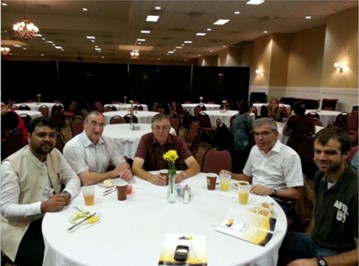Route to possible new therapies for Neisseria gonorrhoeae infections published

Global-NAMRIP member Ravi Kant has just had his latest study published in the Journal of Biomolecular Structure and Dynamics, researching basic science to underpin the route to possible new therapies for Neisseria gonorrhoeae infections.
The study attempted to highlight the structural and functional relationship between Ng-MurI and D-glutamate to design novel molecules targeting this interaction, by constructing a three-dimensional model of the protein. The team identified the binding site of the protein, and validated and employed the pharmacophore model for high-throughput virtual screening and molecular docking to identify novel Ng-MurI inhibitors. The team confirmed the stability of the protein-ligand docked complexes, and identified compounds may act as new leads to design and develop Ng-MurI inhibitors (and therefore new therapies).
The paper, entitled ‘Identification of novel inhibitors of Neisseria gonorrhoeae MurI using homology modeling, structure-based pharmacophore, molecular docking, and molecular dynamics simulation based approach’, is co-authored with Prakash Jha, Daman Saluja and Madhu Chopra (all, like Ravi, from the Dr. B. R. Ambedkar Center for Biomedical Research & Delhi School of Public Health, Institutions of Eminence, University of Delhi, India).
Ravi previously won a Global-NAMRIP award to support his research from a competition hosted at Global-NAMRIP's first virtual conference (17 June 2021) for his work 'Combating the global AMR challenge by targeting Glutamate racemase (MurI) from the cell wall biosynthesis pathway of Neisseria gonorrhoeae : A computational approach'.
Ravi will shortly commence a research visit to the University of Southampton with Professor Myron Christodoulides, funded by the BBSRC-UKRI International Partnership Fund.